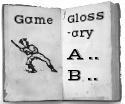| Description
|
[A] As played in Eastern PA in the 1850s this game is recalled as having four or five bases or “safety spots,” tagging instead of plugging, the fly rule, the sharing of bases by multiple runners, and a bat made of a rail or clap-board. A game “similar to baseball” recalled as being played by school boys in 1891 in a grove of trees in Beech Grove, Kentucky.
[B] Another game called Round Town is described as follows:
An Old Virginia Ball Game
Mount Crawford, a town in Rockingham County, Va., was the scene of a novel
ball game on, January 13 last, the occasion being a contest at the old
Virginia game of ball known as "Round Town, " the weather being unusually
mild for winter.
This game is well understood and is much enjoyed by every country boy, though only a very few of their city cousins know the first rudiments of it.
Forty-four men and boys were engaged in the game mentioned above, and they
were the best throwers, surest catchers, and hardest strikers of the two
neighborhoods. A large sized crowd watched with unabating interest the
movements of the game. The game of round-town is played in this manner: Two sides are formed, the number of players of the division being equal. Four
bases are used and are placed in the same manner as if they were being fixed for a game of baseball, although men are only placed in the positions of the pitcher, catcher, and first baseman, the rest of the players being scattered in the field where they think the ball is most apt to be knocked. The first batsman on the opposing side takes his place at the plate, and he has in his hand a paddle an inch or two thick, and in which only one hand is used ins
striking. The pitcher delivers a solid gum ball with all the swiftness
attainable, the use of the curve never being thought of, and it is therefore
very seldom that a "strike out" occurs. The batter hits the ball at the
first opportunity and endeavors to drive it over the heads of the opponents,
for if it is caught on the fly or the first bound the runner is called out,
and also if it is begotten to the first baseman before the runner arrives at
the base. Should the runner reach first base safely he can continue to run
to the other bases if he wishes, but his opponents have the privilege of
hitting him with the ball, and as it is very painful to be struck with a gum
ball, the runner is very cautious, and if he is struck he is counted out of
the game, although should he reach any of the other bases he is safe.
Another batsman appears and if he makes a safe hit with the ball the runners
can continue to move until stopped from fear of being hit with the ball. In
case a man is on second base and a ball is knocked and caught on the fly or
first bound, the runner must stay at the base until the ball is returned to
the pitcher. Each side has only one inning and that continues until every
man has made out: therefore if a man makes an out at the first time at the
bat he is disqualified to play until all on his side have done likewise, then
they take the field. If a player makes the circuit safely it is called a run.
The result of the contest was the success of the Mt. Crawford twenty-two by a score of 104 runs to 90, the contest occupying the whole afternoon.
|
| Sources
|
[A] J. Lambert and H. Reinhard, A History of Catasaqua in Lehigh County (Searle and Dressler, Allentown, 1914), page 364.
[A]William F. Mason, The Journal of William Franklin Mason, completed in 1954; from http://ftp.rootsweb.com/pub/usgenweb/ky/elliott/mason/ mason29.txt, accessed 2/24/2008.
[B] New York Clipper January 1866. 19cbb post 2/2/2002 by John Freyer
|
